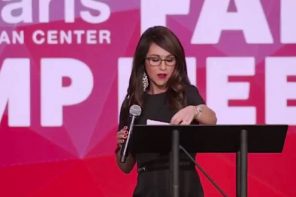Conservative Christian social media influencers have an important message to deliver after a new documentary about the Duggar family thrust the conservative Christian Institute in Basic Life Principles into a mainstream spotlight: We’re not like them—they’re a fringe organization. And if we are like them, it’s only in the good ways that are being purposefully obscured and maligned by bad-faith actors.
But how “fringe” is an organization that purports to have garnered more than two million attendees, including at least one active Congressperson and several former presidential candidates?
Shiny Happy People: Duggar Family Secrets hit Amazon Prime on June 1 and quickly became the most popular content on the platform according to Story Force, the production team whose past exposés include Amazon Prime’s LuLaRich and the 2015 Oscar-winning film Spotlight. The four-episode series details the meteoric rise to prominence of Jim Bob and Michelle Duggar and their nineteen children, whose series of Discovery and TLC reality television shows from 2004 to 2021 depicted their fundamentalist religious beliefs as the quirky but ultimately wholesome glue that kept their supersized family uncommonly close and serene.
The docuseries details the consecutive series of scandals that upended the Duggars’ “shiny, happy” image—including eldest son Josh’s 2021 conviction for receiving and possessing child sexual abuse materials—while providing context about the conservative Christian organization that formed the backbone of the Duggars’ own beliefs and practices. The Institute in Basic Life Principles (IBLP) is a parachurch organization founded in 1961 that provided homeschooling materials and conferences inspired by the beliefs of charismatic leader and founder Bill Gothard.
Gothard, who was ousted from his own ministry in 2014 after more than 30 women accused him of harassment and molestation, encouraged parents to have as many children as physically possible and shelter them from the outside world by homeschooling, homechurching, strictly limiting their engagement with secular culture, and even orchestrating their marriages through betrothal and courtship arrangements with other IBLP families.
With their permed hair and floor-length homemade dresses, the IBLP families featured in Shiny Happy People depict just what many conservative Christians have argued in the days since the docuseries’s release: that Gothardism represents an insulated, fringe iteration of conservative Christianity that gives “real” Christians a bad name.
The history of Gothard’s role in shaping 20th and 21st century American evangelicalism tells a different story.
Gothardism in public life, then and now
By the time Gothard changed its name to the Institute in Basic Life Principles in 1989, the organization had already sold out countless civic centers, arenas, and theaters around the country; launched the homeschooling curriculum it would continue to sell for decades; weathered several sex abuse scandals; and begun a pastor training program that would ultimately teach a reported 30,000 Christian pastors.
Conference participants would grow to include Mike Huckabee, former Texas governor Rick Perry, former mayor of Indianapolis and deputy mayor of New York City Stephen Goldsmith, and current U.S. Representative Daniel Webster (R-FL). Past members of the IBLP’s Board of Directors and Advisory Board include billionaire and part-owner of the San Antonio Spurs James Leininger, former Congressman Sam Johnson (R-TX), and Georgia State Senator Ralph T. Hudgens.
Gothard’s foundational beliefs—the eponymous “basic life principles” and their attendant 49 “character qualities,” including deference, meekness, obedience, and orderliness—have also made their way into the bloodstream of a variety of American institutions. In 1992, IBLP board member Thomas Hill established the “secular” face of the IBLP, an organization called Character First! that adapted Gothard’s series of character qualities for use in a variety of non-religious settings.
Character First’s resources—which staff openly admit are designed to “teach people how to be like Christ”—have been used by countless public school boards, city police forces, and public and private correctional facilities. In These Times reported in 2006 that Character First’s seminars had been used by organizations including but not limited to Coca Cola, McDonald’s, the U.S. Navy, the U.S. Marine Corps, the U.S. Bureau of Prisons, and the U.S. District Attorney’s office.
Out of Character First! grew the International Association of Character Cities (IACC), founded in 1998 to implement Gothard’s character qualities in city government structures and leadership. At its peak in the late 2000s, the IACC boasted over 150 verified “Character Cities” in the U.S. and another 48 outside the U.S.. In her role as mayor of Wasilla, Alaska, Sarah Palin attended an IACC conference and later led the Wasilla City Council to pass a resolution pledging to uphold Gothard’s character qualities.
As Julie Ingersoll details in her book Building God’s Kingdom, Gothard’s teachings are just one node in the extended universe of Christian Reconstructionism, a theological and political movement aimed at bringing family, church, and civil governments alike under God’s “jurisdictional authority.” While Gothard is best known for his theology of authority within family structures, it’s this same theology of immediate, joyful obedience and deference to authority figures in the home, church, and government that has spread far beyond card-carrying members of the IBLP.
Fringe theology?
If Gothard’s theology of authority structures continues to echo through politicians and organizations that have—knowingly or unknowingly—inherited his teachings, his strict theologies of gender and sexual control live on through the myriad conservative Christian churches and ministries whose own theologies of gender and sexuality don’t diverge meaningfully from the IBLP’s.
As former IBLP members attest in Shiny Happy People, the organization’s strict behavioral guidelines and emphasis on immediate submission to authority enforced through corporal punishment, created an environment ripe for all kinds of abuse of power. What’s more, they argue, many of the beliefs and practices that endangered them as children being raised according to IBLP principles are—rather than being the regrettable excesses of some fringe movement—endemic to American evangelicalism itself. The final episode of the docuseries features a montage of popular conservative Christian “influencers” who, interviewees say, simply put a millennial pink gloss on the same conservative theologies of gendered authority and sexual control that animated the IBLP.
In the days following Shiny Happy People’s release, the influencers featured in the series and plenty of outside commentators have decried what they argue is the series’ anti-Christian messaging. The IBLP is not representative of their faith, they say, and the organization went astray from its mission to the exact proportion that it twisted the gospel of Jesus Christ and strayed from “true” Christianity.
Conservative Christian influencers respond
Calling the documentary in which they were featured a “hit piece [on Christians],” YouTubers Paul and Morgan Olliges released a video in which they argue that the IBLP—in which Paul’s own family dabbled—represents “cultism” that distorts the Bible’s call to wifely submission for its own ends. The documentary, the Olliges proclaim, fails to make a distinction between “fringe extremists” and “solid Biblical Christians,” whose authoritarian gender structures differ from the IBLP’s in ways the Olligeses never explicate. Indeed, they admit, “sometimes extremism is simple Biblical obedience.”
Sisters Bethany Beal and Kristen Clark, founders of a “biblical womanhood” ministry called Girl Defined, whose clips were featured in the docuseries, similarly reject what they describe as Shiny Happy People’s “slimy” anti-Christian bias. In a podcast debriefing their experience watching the series, Beal and Clark reveal that they participated in IBLP programs even as they describe it as a “fringe movement.” Rather than reject the whole organization as a distortion of the gospel, however, Beal and Clark lament the lack of “other voices” touting the benefits of the organization.
“Where are the other people in the docuseries saying, like, okay, hey, like, I was in that program or I was a part of that conference and here’s my experience,” Beal says. “It didn’t wreck everyone’s life in the way they’re portraying it and in fact it was a very small fringe movement within Christian conservative, Christian conservative Christianity.”
Christianity is as Christianity does
The ongoing influence of Gothard’s theology might best be illustrated in the figure of Alex Harris, the son of Gregg Harris, one of the key architects of the U.S. homeschooling movement in the 1980s and the brother of Joshua Harris, whose 1997 book I Kissed Dating Goodbye made waves in American evangelical purity culture. Alex Harris—a lawyer who has clerked for both Justice Anthony Kennedy and then-Judge Neil Gorsuch—tweeted that he participated in the docuseries to tell the story of his own family’s involvement in the movement to “take America back for God” and to explain how his own religious views have shifted over time.
In a review of the docuseries for The Gospel Coalition, Harris expressed his empathy for survivors of abuse within IBLP while also noting that he knows “people who had positive experiences with IBLP.” Harris also critiqued the filmmakers for “equating Gothard’s genuine extremism with beliefs held by the vast majority of evangelicals,” though, much like the series’ other conservative Christian critics, he did not elaborate on the differences between the two.
In fact, The Gospel Coalition (TGC) itself platforms a number of pastors whose views seem more or less in line with Gothard’s. TGC contributor Voddie Baucham, for example, is a strong proponent of early and often corporal punishment for children, even going so far as to advocate “all-day sessions” of physical punishment for toddlers in order to “wear them out.” Baucham, who helped popularize the Stay-at-Home-Daughter Movement, has written that a father’s job “is to present our daughters to their husbands as virgin brides.”
Baucham is not an outlier among TGC’s contributors. TGC council member Kevin DeYoung wrote an editorial for the site in 2020 advocating that Christians “strongly consider having more children than you think you can handle” as a “culture war strategy” to out-breed the non-religious.
“The future belongs to the fecund,” DeYoung concluded.
John Piper, a fellow TGC council member, has argued that the sexual abuse of women highlighted by the #MeToo movement is the result of Americans’ failure to teach and respect God-given gender roles. Piper has similarly argued that women should not take on any social role or career that would put her in a position of “personal and directive” influence over a man, writing that a female drill sergeant would violate her subordinates’ “sense of manhood.”
If Harris truly believes that Gothard’s teachings represent “genuine extremism” that deviates from mainstream evangelicalism, those differences aren’t to be found in the views of his fellow contributors at TGC. Those interested in circling the wagons around “normal” evangelical beliefs might consider getting more specific about where and how their own theologies of authority, gender, and sexuality would protect against abuse of power. Otherwise, they feed into a no-true-Scotsman fallacy that dismisses the bad fruit of their beliefs as the exception to the rule.
In the days following Shiny Happy People’s release, executive producer Cori Shepherd Stern says she’s received a deluge of messages from viewers “who weren’t directly involved with IBLP but who grew up in a wide variety of Christian churches, who related to the deep and lasting pain experienced by the survivors in the documentary.”
Stern says she hopes viewers will stop and consider just how pervasive theologies of shame and anxiety are in American Christianity.
“I’ve seen a few comments that we made this documentary ‘to make Christians look bad,’” Stern told Religion Dispatches. “No. The people who look bad are the ones who respond to suffering and mistreatment by saying ‘it’s not my responsibility. That’s not my community.’ We’re all each other’s community. I made this documentary because I’m my sister’s keeper…. I couldn’t turn away without hazarding my own soul.”
As for what Stern hopes viewers take away from the documentary? In an extended Q&A session on Reddit, Stern answered:
“Don’t be evil.”





